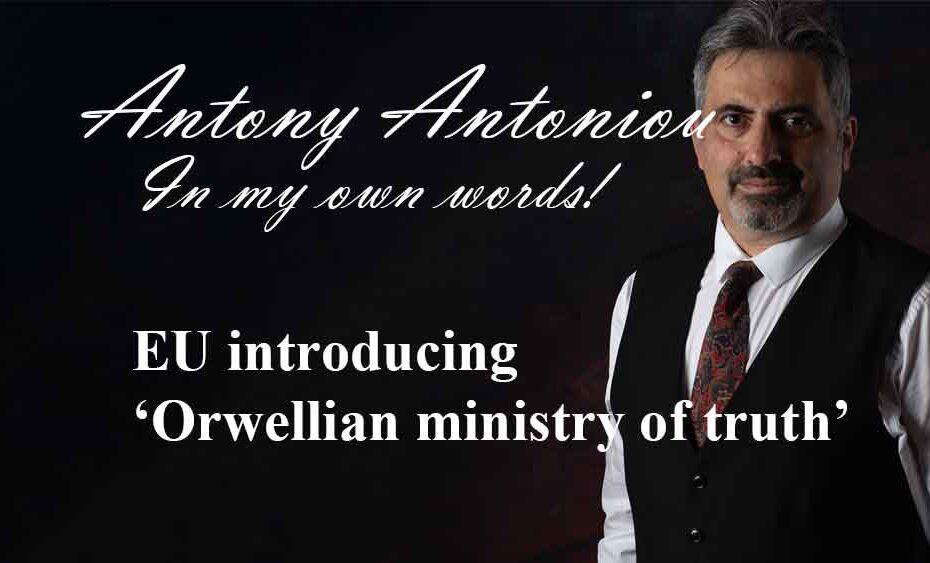EU introducing ‘Orwellian ministry of truth’
EU’s “Ministry of Truth” Controversy: Tackling Fake News Online
Introduction
In a move that has stirred controversy and drawn comparisons to George Orwell’s dystopian novel “1984,” the European Union (EU) has rolled out a new plan to combat what it perceives as online “disinformation.” This regulation, known as the Digital Services Act (DSA), has sparked debates over its impact on free expression and its potential to shape the digital landscape.
The Ministry of Truth Analogy
Critics argue that this approach grants the EU excessive powers in determining the veracity of content published on some of the world’s largest websites. Cristian Terhes, a Romanian Member of the European Parliament (MEP), voiced concerns over the EU’s Digital Services Act (DSA), likening it to the creation of a government-sponsored “Ministry of Truth” reminiscent of Orwell’s fictional world.
Terhes commented to The Telegraph, “The European Commission has taken a page out of Orwell’s 1984 and demanded that EU member states set up government-sponsored ministries of truth to ensure that wrong thoughts and banned words are not allowed into the digital space.”
Regulating Online Content
The DSA, which came into force on August 25, outlines the requirement for the EU’s 27 member states to establish a network of “trusted flaggers.” These experts are individuals with prior experience in monitoring and identifying harmful or illegal online content. The primary objective of this regulation is to establish new standards for combating hate speech, disinformation, and counterfeit products online, and it is applicable to all major digital platforms.
Originally aimed at tech giants like Google, Amazon, and Facebook operating in Europe, the DSA will be extended to websites and online platforms that attract at least 45 million monthly users.
Impact on Tech Giants
The EU’s venture into regulating big tech has already yielded notable results. For instance, Twitter, now known as X, was compelled to introduce a new hate speech policy blocking users from disseminating “hateful imagery” like the Nazi swastika. The DSA also prohibits targeted advertisements based on users’ region, gender, or sexual preferences, and it introduces a mechanism requiring platforms to disclose the measures they are taking to combat alleged misinformation or propaganda.
In response, tech giants have expanded their teams to navigate the intricate bureaucracy imposed by the EU. Facebook’s Sir Nick Clegg revealed that the company had assigned over 1,000 staff, constituting one of the “largest cross-functional teams in our history,” to ensure compliance. TikTok also announced a similar commitment, assigning more than 1,000 staff members to handle compliance matters.
Legal Challenges and Controversy
However, some digital heavyweights, such as Amazon and German online retailer Zalando, have initiated legal challenges to contest their classification as “very large online platforms” under the new rules.
Protecting Freedom of Speech
EU officials have sought to assure the public that the system is not intended to curtail freedom of speech or expression. They argue that trusted flaggers will be appointed by national bodies established by member states, thereby ensuring that their legal systems can enforce the DSA. This approach is meant to distance the EU from direct influence over content.
A spokesperson for the commission emphasized, “Under the DSA, providers of online platforms shall take the necessary technical and organizational measures to ensure that notices submitted by trusted flaggers are given priority and are processed and decided upon without undue delay. That being said, nothing in the DSA obliges platforms to remove lawful content.”
Conclusion
As the EU takes its first major steps in regulating the digital landscape, the debate over the balance between combating misinformation and preserving free expression rages on, leaving many to ponder the implications of this “Ministry of Truth” in the digital age. The trusted flagger scheme is not expected to be fully implemented until February 2024, meaning that this contentious issue is likely to continue shaping discussions surrounding online content regulation in the years to come.

